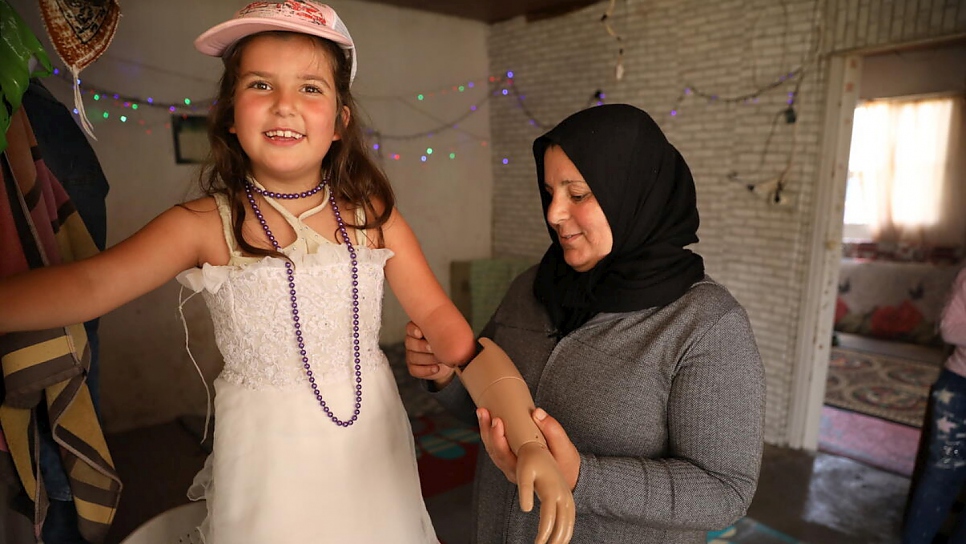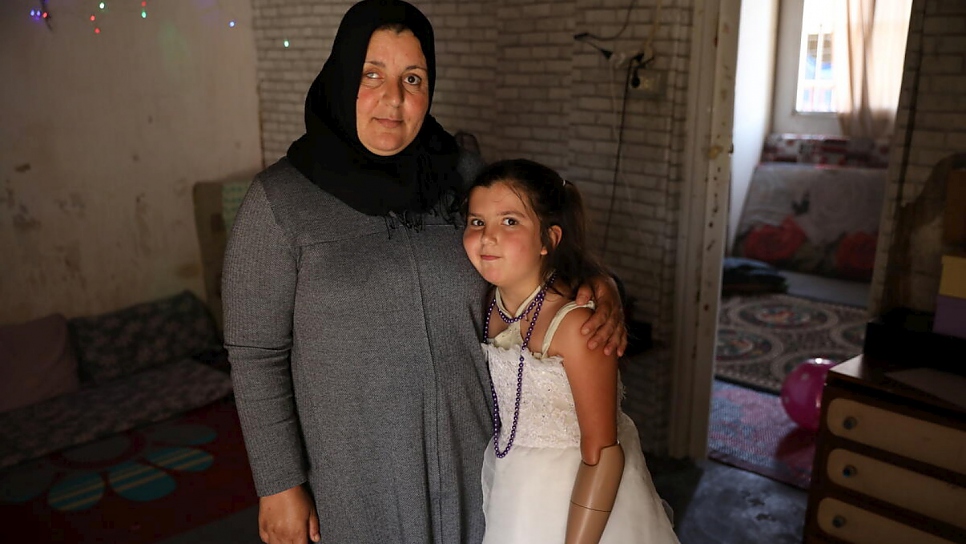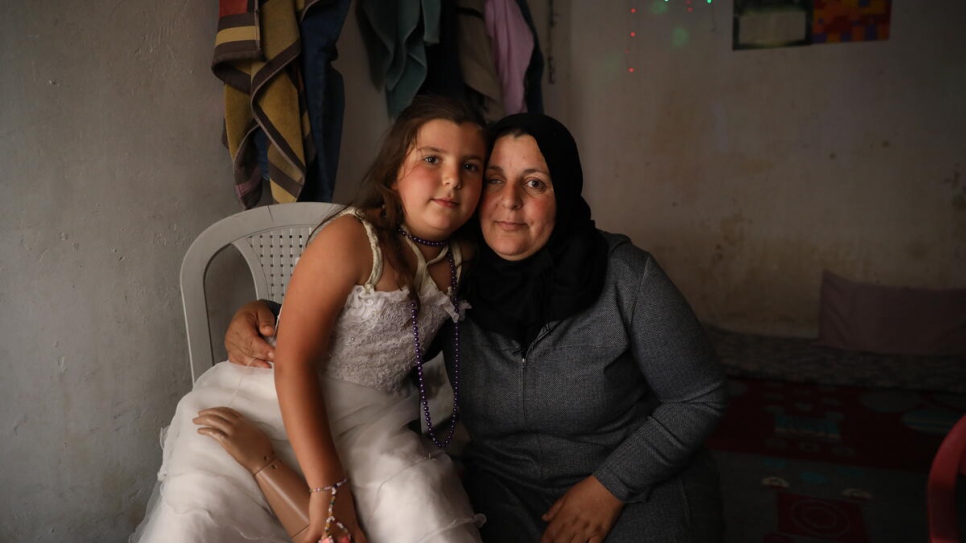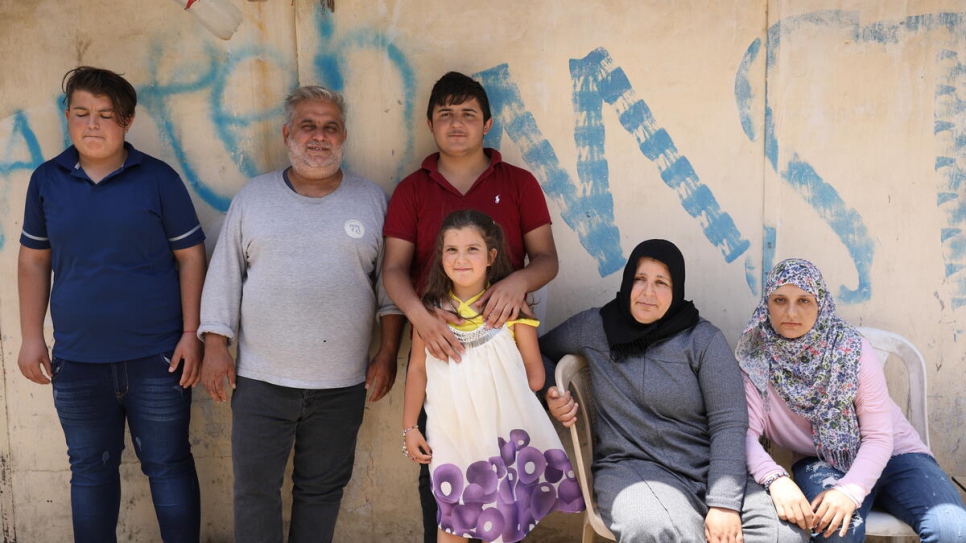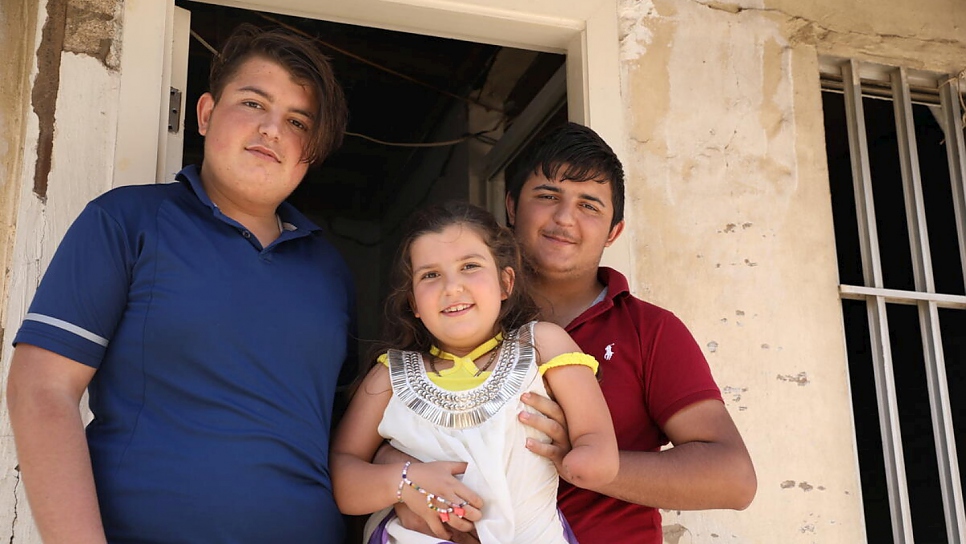Child's joy helps Syrian refugee family weather Lebanon's economic crisis
Born without a forearm, Sarah's playful spirit gives her struggling family strength as economic crisis makes a tough situation harder still.
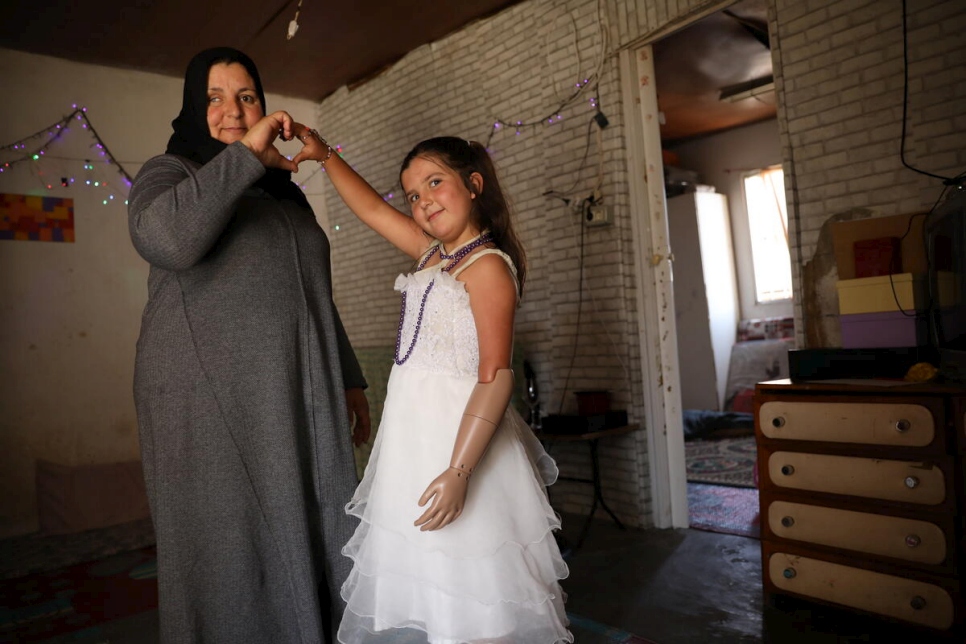
Sarah and her mother Safiyah in their apartment in the Lebanese capital Beirut. © UNHCR/Houssam Hariri
On the roof of an old building, in a poor, crowded neighborhood of the Lebanese capital Beirut, eight-year-old Sarah smiles and laughs as she plays. She wears a brightly coloured dress and a necklace of shiny plastic pearls as she skips about, high above the bustling streets below. Sarah was born without a left forearm, and she is as enthusiastic as any other girl of her age.
“She has a passion for light, colour, life,” says Sarah’s mother, Safiyah, who also lives with a disability, after losing sight in one eye and part of her hearing as a result of injuries sustained before fleeing Syria.
Sarah, her mother, father, sister and two brothers live in a simple two-room rooftop shack, strung with glimmering fairy lights that make Sarah smile. The family left Syria with nothing, and the lights sparkle over their meagre possessions: folded-up mattresses and synthetic straw rugs that cover the rough concrete floor, a few old cabinets, a closet.
Despite the hardship, a few colourful dresses that Sarah changes into multiple times a day, and some paper and crayons for drawing are able to make her happy.
The situation for the family has worsened recently, due to the devastating impact of Lebanon’s economic crisis that has resulted in the currency losing over 90 per cent of its value since 2019. Vulnerable refugees have been among the hardest hit, unable to afford basic amenities like food, medicine, and education.
Sarah’s older brothers, Rabih, 18, and Doreyd, 17, work long hours in menial jobs, mending shoes and cleaning. Sarah’s father is a cobbler too, earning just USD10 (400,000 Lebanese lira) a week. Her mother is unable to work because of her injuries and her older sister, Ruwaida, 23, also remains at home.
Sarah is enrolled in the Basic Literacy and Numeracy (BLN) programme, run by UNHCR, the UN Refugee Agency, for out-of-school children aged 8-14, but her siblings have abandoned their education altogether, a bitter reality for many children in Lebanon – refugee or otherwise – who often forgo education to help earn a living. In 2021 alone, primary school attendance for children under 14 dropped by 14 per cent while almost a third of children have never attended school.
There are 1.5 million Syrian refugees in Lebanon, according to government figures. Today, 90 per cent of them require humanitarian assistance to cover their most basic, lifesaving needs, while over half of the Lebanese population of approximately seven million is also estimated to live below the poverty line. Conditions are becoming unbearable for many and are set to worsen through the cold winter months, with the country’s continuing economic crisis expected to plunge already-struggling families into deeper poverty.
"The situation in Lebanon is getting worse."
Food prices have increased more than five-fold since 2019, meaning families are having to skip meals or resort to cheaper, less nutritional foods. The devaluation of the local currency has also made access to affordable health care near impossible, while medicines have become hard to find. It is estimated that over a third of refugees requiring medical treatment last year were unable to afford it. UNHCR, is seeking to alleviate the situation with initiatives including rehabilitating health-care centres and providing essential medical equipment to hospitals, to help refugees and Lebanese gain access to primary and secondary health care.
“I am worried because of the living conditions. The situation in Lebanon is getting worse,” says Safiyah. “Our condition is tragic.”
Yet against this harsh backdrop of displacement, economic crisis, and disability, Sarah’s enthusiasm and hope are a source of strength for the whole family. “Sarah tells me that, ‘We must be patient as God took a part of me and a part of you. You lost your eye, and I lost my arm, but God will make everything right again’,” says Safiyah. Sarah dreams of “a golden arm” that will allow her to live life like her friends without disabilities.
“I would like to one day have a normal arm, one that moves so I can be like all my friends, so I can be happy, and climb,” Sarah says. She longs to be able to “have a shower on my own, and comb my hair myself” and, she adds joking, “hit my brothers”.
UNHCR partnered with Lebanese NGO Bionic Family to provide Sarah with a prosthesis made from recycled materials. While it may not be golden, it does help her in everyday tasks and provides her with a sense of comfort.
When she first had it fitted, Sarah was excited. “I told my friends, 'Look at my new arm!’” she says. But because her current prosthesis is basic, with the hand in a fixed position, she admits, “there are times when I wish it would move like a real one.”
She keeps dreaming, that, one day, her wish will come true.


